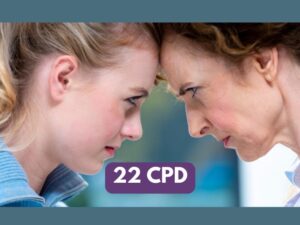Anxiety in ADHD, ASD, and SPD: Learn Practical Strategies
- Description
- Curriculum
- FAQ
- Reviews
The “Understanding Anxiety Online Course” offers a comprehensive program that provides a deep understanding of anxiety.It covers its causes, symptoms, and effective coping strategies. This course offers an extensive curriculum, exploring various types of anxiety disorders. These include generalized anxiety disorder (GAD), panic disorder, social anxiety disorder (SAD), and post-traumatic stress disorder (PTSD).
Participants will gain valuable insights into the factors contributing to anxiety, whether their own or others’. The course also explores the physiological aspects of anxiety. It explains how anxiety affects brain chemistry and overall well-being. In addition, the course emphasizes the importance of self-care practices.
We equip learners with practical techniques to manage anxious thoughts effectively. These include breathing exercises, mindfulness, and cognitive-behavioural therapy (CBT). The course also covers other tools for coping with anxiety. Whether you’re seeking personal growth or pursuing a career in mental health care, this course is beneficial. It will provide invaluable knowledge about anxiety and empower you to navigate life’s challenges with greater confidence.
For additional resources, check out our blog posts and explore free materials in our shop. Interested in becoming an affiliate? Contact us here.
-
1Module 1: What is anxiety?Text lesson
At the end of this module, you will be able to explain and define ‘anxiety’. You will also know about the symptoms and causes of various anxiety disorders. The difference between anxiety and fear is also discussed.
-
2Module 1 test30 questions
-
3Module 2: Types of AnxietyText lesson
In this module, you will learn about various types of anxiety such as social anxiety, specific phobias, obsessive-compulsive disorder, post-traumatic stress disorder, as well as panic disorder.
-
4Module 2 test30 questions
-
5Module 3: Anxiety in Special NeedsText lesson
At the end of this module you will be able to distinguish between a diagnosis of a special need and anxiety, as well as know how to help someone with a special need that has anxiety. You will also be able to identify teacher burnout.
-
6Module 3 test30 questions
-
7Module 4: Medications and SupplementsText lesson
In this module you learn about the commonly prescribed medications for anxiety. Alternative medications, supplements, the role that cannabidiol oil can play in the treatment of anxiety as well as herbal remedies are also discussed.
-
8Module 4 test30 questions
-
9Module 5: Cognitive behaviour therapyText lesson
This module is an in depth discussion of Cognitive Behaviour Therapy (CBT); how it works, what it entails and what the steps and results may be when you apply it.
-
10Module 5 test25 questions
-
11Module 6: Other Therapy Techniques IText lesson
Learn how various alternative therapy techniques can help alleviate the symptoms of anxiety. Such techniques include: animal therapy, art therapy, exposure therapy.
-
12Module 6 test20 questions
-
13Module 7: Other Therapy Techniques 2Text lesson
More additional alternative therapy techniques which can help alleviate the symptoms of anxiety are discussed. This includes massage, aromatherapy, and mindfulness.
-
14Module 7 test15 questions
-
15Module 8: Exercise and DietText lesson
This module discusses how diet and exercise can affect anxiety disorders. It also discusses the best practices regarding both exercise and diet.
-
16Module 8 test15 questions
-
17Module 9: Other Lifestyle ConsiderationsText lesson
This module discusses the relationship between sleep and anxiety, as well as the importance of a holistic healthy lifestyle for anxiety management. Therapy-based treatments that can be used to treat anxiety is also discussed. You will also know how lifestyle routines can help prevent and treat anxiety.
-
18Module 9 test15 questions
-
19Module 10: Relaxation ExercisesText lesson
A number of relaxation exercises are discussed. You will also learn how to naturally initiate a relaxation response when experiencing anxiety. Hydrotherapy is also discussed.
-
20Module 10 test10 questions

Archive
Working hours
| Monday | 9:30 am - 6.00 pm |
| Tuesday | 9:30 am - 6.00 pm |
| Wednesday | 9:30 am - 6.00 pm |
| Thursday | 9:30 am - 6.00 pm |
| Friday | 9:30 am - 5.00 pm |
| Saturday | Closed |
| Sunday | Closed |







